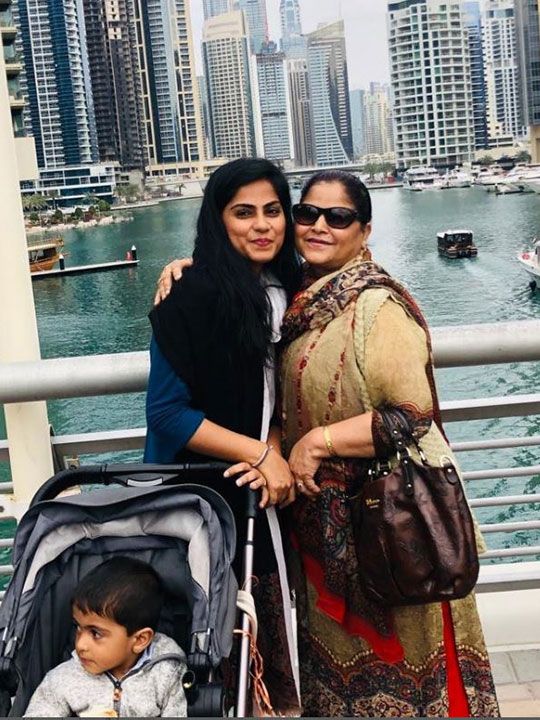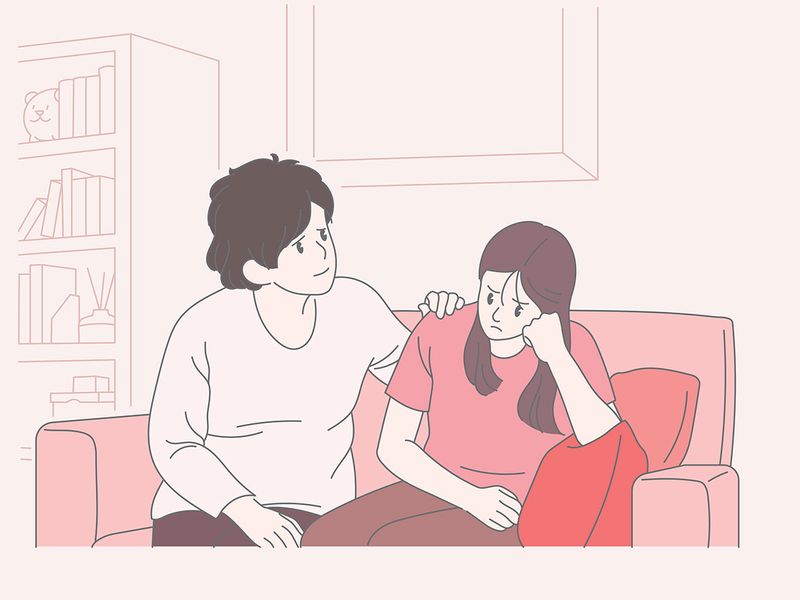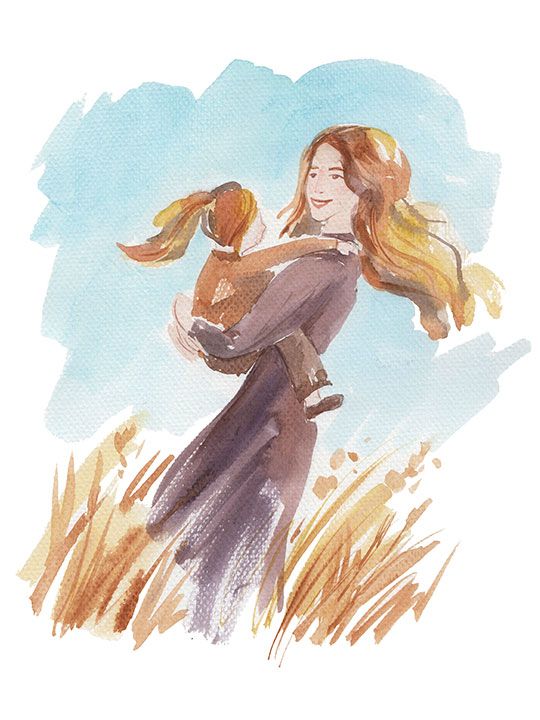
As she lay on her bed gasping for air, the tubes cascading down the hospital bed, my mother managed to get out a few sentences. “Take down my passwords…,” she began as I shuddered in fear. It was the moment I realised that my mother – whose mortality was a distant nightmare – was not as indestructible as I believed.
Ten years on, sometimes the memory will haunt me as I see my usually tough-as-titanium mother complain about an ache in her wrist or a pain in her stomach. But the gut-wrenching fear that grows from love isn’t the only thing that has pecked at me over the years. There have been episodes of resentment and rage, and claustrophobia laced with hate; fortunately, the love ultimately wins these bouts, but it’s easy to get trapped in the circle of argument. It doesn’t happen to me with anyone else though – this is a mother-daughter special.
And apparently not as rare as I once believed. It’s a metaphorical mountain range that a daughter climbs with her parent, rumbling along the valleys and peaks; the only thing that doesn’t change is that feeling of togetherness.

Our early experiences map our understanding of ourselves, our ability to trust our caregivers and how we relate to others.
The umbilical attachment that formed in the womb tends to grow once the baby is born, cemented by shared traumas, common experiences and pockets of time where one heals from any wounds inflicted by the world. Dr Waleed Ahmed, Consultant Psychiatrist, Priory Wellbeing Centre Abu Dhabi, explains the instinctive bond between primary caregiver and child: “As mothers are usually the primary caregivers for children, a child’s relationship with their mother is extensively researched and discussed in developmental psychology literature. Attachment theory describes the instinctive bond between an attachment figure, usually a mother, and her child that serves the need for security and survival of the latter.”
Shifting loyalties
Amelia Simpson, Consultant Psychologist at Dubai-based Reverse Psychology, adds that attachments evolve in infants’ lives. She says: “Throughout the first months of infancy, babies show different attachments to their caregivers and others. For example, between three to seven months, the babies' attachment to the primary caregiver increases as the caregiver responds to their needs; after approximately nine months of age, children begin to form strong emotional bonds with other caregivers beyond the primary attachment figure, for example, fathers, older siblings, and grandparents.
“There are four patterns of attachment:
Ambivalent attachment: Considered uncommon, these children become very stressed when a parent leaves. As a result of a lack of parenting availability, children cannot depend on their primary caregiver to be there when needed.
Avoidant attachment: Children tend to avoid the caregiver, showing no preference, this attachment style might be a result of abusive or neglectful caregivers. Children who are punished for relying on a caregiver will learn to avoid seeking help in the future.
Disorganised: These children can display a confusing mix of behaviours and may avoid or resist the parent. This is likely linked to inconsistent parenting, parents may serve as both a source of fear and support.
Secure attachment: Children who depend on their caregivers show distress when separated and joy when reunited, although the child may be upset, they feel assured that the caregiver will return. As we grow older, we may exhibit a combination of attachment styles, for example, dismissive-avoidant or fearful-avoidant, depending on these experiences in childhood."
“Our early experiences map our understanding of ourselves, our ability to trust our caregivers and how we relate to others,” adds Simpson, explaining the need for a happy initial relationship.

Mirror effect
Often, the early years will also mean a girl modelling her behaviour after her mum. “With young children, a mother can often see the fruit of her labour in raising her daughter, which can be explicitly validating, especially when the daughter idealises her mother. In those instances, the daughter may put in the effort to receive attention from her mother, and the mother, in turn, feels validated when she recognises how much her daughter emulates her. There may be instances of physical affection, verbal affirmation about being ‘the best mummy ever’, etc.,” explains Bene Katabua, Educational Psychologist at Intercare Health Center in Abu Dhabi.
This mirror effect creates an interdependent, healing connection; mums come to rely on their daughters for emotional support. And for a while, everyone is on the same page. Then come the ‘terrible’ teens and 20s. “As the daughter becomes less dependent on the mother and starts to make some of her own decisions - that can cause rifts in the relationship. This is most evident when the daughter's thoughts and beliefs start to differ from those of her mother. This ‘coming into self’ can often feel like rejection.

As the daughter becomes less dependent on the mother and starts to make some of her own decisions - that can cause rifts in the relationship.
“We'll often hear mothers commenting that their daughters have suddenly changed and feel like strangers, and likewise many daughters state that they feel misunderstood by their mothers. In those instances, neither one is being heard, nor validated and may develop unhealthy ways to relate to one another. It's difficult to feel secure in this kind of relationship, so the ways in which they communicate is often harmful. There are more instances of manipulation, passive-aggression, vindictiveness, harsh criticism, etc. However - the needs are still there. Both mothers and daughters still need to be heard, affirmed, validated, etc.,” adds Katabua.
Age gaps
UAE-based Indian expat Fabiha Khalid recalls the era of individuality well – and the generational rift that followed. She says: “In our teens and 20s, my sister and I were constantly at loggerheads with mum. Modern education not only changed the language we spoke, it changed our mind-set, it broadened our horizons, it enabled us to see ourselves as breadwinners and be autonomous. Sadly, mum hadn’t caught up. I remember that as being a challenging time for our relationship, from the constant ‘sit-up straight and don’t slouch’ to ‘dress better and wear heels’, the conversations about ‘be more polite to such-and-such auntie because she’s a match maker’, that feeling of being like a flower vase displayed on the living room mantle. Our relationship suffered because mum was too worried about society’s judgement of her daughters rather than their well-being.

“Miraculously, we got married. My mum won the imaginary trophy of ‘getting your daughters married off on time’. Thankfully, our relationship mended after that. She’s my BFF (best friend forever) again. One day I asked her why did she [hound] us so much marriage and she said that she was the one who pushed dad to send us to an English medium school, thereby helping us break the glass ceiling. But she couldn’t bear to see us walk away from tradition,” she says.
Broader context
This is an element most take for granted; the role of cultural norms in a fractured relationship. Simpson explains, “The arguments that occur between mother and daughter are rarely about the issue being argued about! To better understand this dynamic, we can look at their attachment within the socio-cultural environment. Within this model, we can understand how mothers and daughters relate, what causes conflict and attachment disruption, and what conditions are required for mother and daughter to have a strong, connected relationship. When working with a mother and daughter, I would first map their relationship history; to get a picture of what it means to be female in the family, within their culture, within society and importantly, identify generational themes that are passed down that may be harmful. Furthermore, consider how this brings about expectations in behaviour, showing love, and maintaining boundaries.”
Understanding the framework also allows for acceptance, and letting go of old grudges. For Khalid, for example, the record has been reset. She explains: “Today, I continue having my little tiffs with mum while she rolls her eyes at me. She still holds on to mind-sets that don’t make sense to me. And yet I continue taking advice about raising children and being a resilient mum from her. I will always need her help to navigate through life and relationships. I will always need my mum who whispers in my ears, ‘You’re the most gorgeous and brightest one in the room’, and all the words which she’s said to me that have sort of become my inner voice.
“I only wish I could raise my children the way my mum did, be half as successful as her and it’ll still be a job well done.”

Irish expat in Dubai, Jessica Neely, explains that hindsight is 20:20. “My relationship with my mum is one I cherish more than anything in this world. I won’t lie – growing up, especially in my teenage and early 20 years, we didn’t have the best relationship. What I saw as her controlling me, was actually always her protecting me and wanting the best for me. I didn’t value that at the time but now looking back I see how loved I was and how much I did not make it easy! It’s normal to go through this phase with your daughter. I was trying to assert myself as an adult and my mum was still seeing me as her little girl. I look back now and think how lucky I am to have a mum who cares about me so much.
“I live in Dubai now and my mum is in Ireland. But our bond is still as strong! She’s the first person I’ll pick up the phone to when I feel down, she’s the first person I want to share my good news with and she’s the first person I go to for advice – especially about my future because I know she always wants the best for me.
“Even though we’re in different countries, there’s not a day that goes by that I don’t think of my mum. Sometimes I do feel lonely that I’m not closer to her to see her often but I always feel her presence and I’m so lucky she’s always only a phone call or text message away! She also loves her holidays to Dubai and now that COVID-19 is finally settling down, I’m really looking forward to having her visit in June,” she adds.
As for me, it was my mum who told me I was so fat I looked like I had multiplied; and she’s the one who took me shopping for clothes that would finally fit right. She was the one most delighted that I had found a partner and most devastated by the prospect of me moving away (I didn’t). She’s the one I’ll call each morning to catch up with and the one I’ll fight with when things aren’t going my way.

It’s an odd connection – love too great to be defined and (sometimes) annoyance too grand to ignore.
Looking for a way to cross the canyon to where to want to be in your relationship with mum? Here’s what the experts suggest.
Junk the judgement. Salma Mahmoud Ahmed, Counselling Psychologist at Openminds Psychiatry, Counselling and Neuroscience Centre, suggests the non-violence communication approach (NVC). “According to NVC approach, the main reason for the love-hate relationship between mothers and daughters is ignoring the satisfaction of the psychological and emotional needs of both mother and daughter. Based on the approach, this conflict can be resolved smoothly and permanently once they both understand the needs of each other and accept them unconditionally, without judgments or criticism. This acceptance may take some time, but it is always the first step in rebuilding the relationship.”
Dr Ahmed calls for forgiveness. “A 2016 study in the ‘Journal of Health Psychology’ showed that despite the accumulation of life-time stress, individuals who scored high on forgiveness scores were at decreased risk of developing poor mental health, which in turn can affect relationships. Although not professional advice, a tip I picked up from a dear friend who used this to improve her relationship with her 12 year old was to start a communication journal with her daughter, who would write her thoughts, views and complaints in it. My friend would caringly and reflectively respond to those entries with her own, without otherwise being judgmental or in the heat of a raging argument.”

A tip I picked up from a dear friend who used this to improve her relationship with her 12 year old was to start a communication journal with her daughter, who would write her thoughts, views and complaints in it. My friend would caringly and reflectively respond to those entries with her own.
Introspect. “For mothers questioning their relationship with their daughters, it would be helpful to first unpack your own relationship with your mother. Before even thinking about what strategies to put in place to better your relationship with your daughter - take stock of how both you and your mother responded to unmet emotional needs. Then, take stock of how that impacts your own parenting, especially in moments of insecurity and tension. What other feelings show up when you feel rejected, and how do you act? What happens when you feel shut out by your daughter? How effective do you feel as a parent when your child does not do as you advised them, and how do you react in turn? These questions are prompts for self-awareness, and can also be helpful when considering what changes need to be made to improve the relationship,” says Katabua.
Change your point of view. Simpson says: “The key to resolving conflict effectively is stepping into the other person's shoes. Sometimes, this can be difficult as we focus on our intense anger, frustration, or distress. We need to resolve these feelings first, settle them, and understand that they are our own feelings and are born out of our own thoughts and beliefs, and whilst certain situations and events may trigger them, they belong to us and are ours to manage. We cannot think clearly or rationally when we are angry, yet we often choose to respond when we are in these states to settle the feeling itself. This only causes a vicious circle in conflict! Taking time to calm the feelings is key to taking perspective and developing compassion.”

Go have fun. Finally, she says, “Sometimes so much of the mother-daughter relationship is bound up in advice, criticism, and carrying out duties for the other person. Go out and do something that you both enjoy! Or even better, make an effort to do something the other person enjoys even if you don’t, then try to understand why they enjoy this and celebrate who they are as a person, even if you disagree with it! This may take some work on your part to consider why you have those expectations and let them go! Accepting that the other person may not be who you want them to be is critical, and celebrating who they are will lead to a deeper connection.”
This is not permissive parenting. Katabua explains: “Unconditional love is not the same as unconditional acceptance. Boundaries, limits and rules can be communicated without making her feel guilty, ashamed or lesser-than. This is done in both words and actions.”
Don’t be too hard on yourself. And for all mums, it’s important to remember that in spite of all those social media filters, the truth is simple; mothering in itself is incredibly complex – and it always was. “The expectation is not ‘perfect parenting’, but rather working on being a ‘good-enough’ mother who is responsive to her daughter's needs most of the time. It's worth repeating that you cannot pour from an empty cup, and therefore - mothers are encouraged to foster and maintain relationships whereby their own emotional needs are being met.”
Write to us at parenting@gulfnews.com








